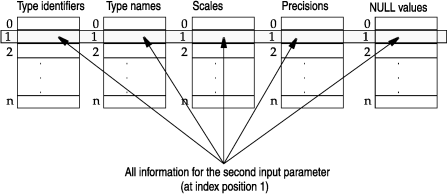Obtain input-parameter information
From a statement descriptor, you can obtain information about an input parameter once an SQL statement has been prepared. An input parameter indicates a value that is provided when the prepared statement executes.
| Column information | DataBlade API accessor function |
|---|---|
| The number of input parameters in the prepared statement | mi_parameter_count() |
| The precision (total number of digits) of the column associated with an input parameter | mi_parameter_precision() |
| The scale of a column that is associated with the input parameter | mi_parameter_scale() |
| Whether the column associated with each input parameter was defined with the NOT NULL constraint | mi_parameter_nullable() |
| The type identifier of the column that is associated with the input parameter | mi_parameter_type_id() |
| The type name of the column that is associated with the input parameter | mi_parameter_type_name() |
- UPDATE with or without a WHERE clause
- UPDATE WHERE CURRENT OF
If you attempt to request input-parameter information for other SQL statements, the input-parameter functions in Input-parameter information in the statement descriptor raise an exception.
| Input-parameter array | Contents |
|---|---|
| Parameter-type ID array | Each element is a pointer to a type identifier (MI_TYPEID) that indicates the data type of the input parameter. |
| Parameter-type name array | Each element is a pointer to the string name of the data type for each input parameter. |
| Parameter-scale array | Each element is the scale of the column associated with the input parameter. |
| Parameter-precision array | Each element is the precision of the column associated with the input parameter. |
| Parameter-nullable array | Each element is either MI_FALSE or MI_TRUE:
|
All of the input-parameter arrays in the statement descriptor have zero-based indexes. Within the statement descriptor, each input parameter in the prepared statement has a parameter identifier, which is the zero-based position of the input parameter within the input-parameter arrays. When you need information about an input parameter, specify its parameter identifier to one of the statement-descriptor accessor functions in Input-parameter information in the statement descriptor.
1 of
these arrays holds the input-parameter information for the second
input parameter of a prepared statement. 
MI_STATEMENT *stmt_desc;
MI_TYPEID *param_type;
mi_integer param_nullable;
...
param_type = mi_parameter_type_id(stmt_desc, 1);
param_nullable = mi_parameter_nullable(stmt_desc, 1);To obtain the number of input parameters in the prepared statement (which is also the number of elements in the input-parameter arrays), use the mi_parameter_count() function.